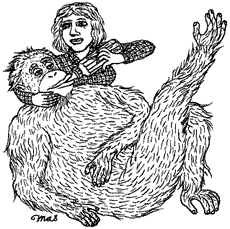News from academe.

Monkey Business I
A controversy is brewing over the popular 1996 book Demonic Males, by Harvard anthropologist Richard Wrangham and science writer Dale Peterson, which argues that male violence is a legacy of our primate past--not a race- or class-based social problem. Some of Wrangham's colleagues have complained that the book's cover is implicitly racist. Depicting four stages in primate evolution, the cover portrays drawings of a orangutan, a chimpanzee, a gorilla, and a generic-looking human male--who according to the image's archival history turns out to be African. Berkeley anthropologist Jonathan Marks, in the May issue of the Anthropology Newsletter, calls Wrangham's juxtaposition of apes with a black man "callous and thoughtless science" that trades on historically racist associations. Wrangham says he worried about the juxtaposition but went ahead with the cover after showing it around. He also says he asked Houghton Mifflin to alter the image for the book's newly released paperback version, but the publisher told him it would be too difficult.
Encounter Group
A new publishing house called Encounter Books will begin issuing right-of-center books, filling the void left by the Free Press, reports the Chronicle of Higher Education. (The Free Press used to publish mainly conservative volumes such as Richard J. Herrnstein and Charles Murray's The Bell Curve and Dinesh D'Souza's Illiberal Education but has distanced itself from a solely right-wing orientation.) Seed money for the new press comes from the Milwaukee-based Lynde and Harry Bradley Foundation. Encounter's editor in chief, Peter Collier, cites Camille Paglia's Sexual Personae and Jim Sleeper's Liberal Racism--both critical of conservative as well as liberal orthodoxy--as the kind of books he'd like to print. He plans to release the first titles in two years.

Monkey Business II
Renowned orangutan specialist and Louis B. Leakey disciple Biruté Galdikas is under attack for allegedly neglecting--and even mistreating--the endangered orangutans in her care. For months, the Internet mailing list Primate-Talk has been flooded with debate over whether Galdikas has allowed her orangutans to grow too dependent on their human caretakers and whether she's exposed the animals to human diseases. The publication last month of an unflattering book about Galdikas called The Follow, by Canadian novelist Linda Spalding, has fueled the controversy. What's more, the Indonesian Ministry of Forestry--with whom Galdikas has clashed over logging policies--has accused the anthropologist of housing "a very large number of illegal orangutans ... in very poor conditions" at her residence. The government is intimating it may bring her up on formal charges.
Eating for Credit
New York University has inaugurated a Ph.D. program in food studies, and Routledge now has an in-house editor devoted to acquiring food studies manuscripts. In October, St. Martin's Press will publish an anthology of essays from the Times Higher Education Supplement titled Consuming Passions: Food in the Age of Anxiety. The book's co-editor Jennifer Wallace, a lecturer at Cambridge University, suggests that food is a source of reassurance in troubling times. "Food is the irreducible factor of daily life," she observes, "... which seems to remain impervious to the sources of anxiety, to politics and ideology, to mental or spiritual hopelessness." Other essays include: "Edible Ecriture," by British Marxist Terry Eagleton, which argues that Samuel Beckett's anorexic prose may betray "a race memory of the Irish famine"; and "Savouring the Antique," by classicist Emily Gower, which warns against romanticizing the Roman bacchanalia, since "most ordinary people experienced famine and lived at subsistence level."
Divided by a Common Language
Jared Diamond, a Pulitzer Prize-winning physiology professor at the University of California Los Angeles, has offered an answer to what he calls "one of the most disputed questions of linguistics": the origins of the Japanese language. Despite their many similarities, Koreans and Japanese have long been mutually hostile and have pointed to the vast differences between their languages as proof that they lack a shared ancestry. But biology and the archaeological record suggest otherwise, Diamond argues in the current issue of Discover. Modern Japanese, he contends, derives from an archaic form of Korean that took root in Japan but was stamped out in Korea during the first several centuries. "Like Arabs and Jews," Diamond warns, "Koreans and Japanese are joined by blood yet locked in traditional enmity. ... The political future of East Asia depends in large part on their success in rediscovering those ancient bonds between them."
Vienna Noise Choir
After a long and contentious residence at the University of Southern California, the Arnold Schönberg Center has decamped to Vienna, the city of the 12 tone composer's birth. Unhappy with USC's attempt to include conventional classical music in the institute's music courses and concerts, Schönberg's descendants successfully sued USC for "neglecting its contract" with the institute. The university had to underwrite the costs of moving the institute's archives and library to a lavish new space at the Palais Fanto in Vienna, where its budget will be tripled in size. The new institute opened its doors in March.

Fair Harvard
The Boston Globe has published a hard-hitting four part series on Harvard University. The series emphasizes that Harvard's prestige has never been greater: Its endowment is vast and its faculty unparalleled. But, the Globe notes, Harvard has accepted donations from foreign dictators, routinely denied tenure to brilliant young faculty, and refused to spend more than a sliver of its almost $13 billion endowment on increased financial aid. One highlight: The Kennedy School of Government is offering more and more minicourses and Harvard certificates to luster-seeking world leaders. Over the past six years, the school has trained "virtually all senior Russian military officers," taking them to visit the "average" American suburb of Wakefield, Mass., as part of their education.